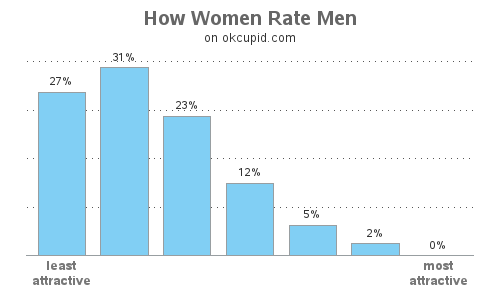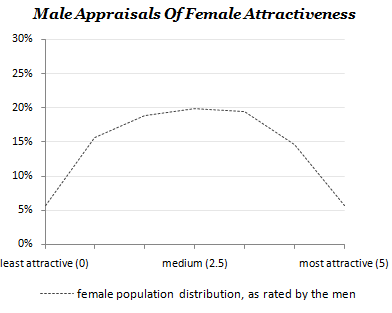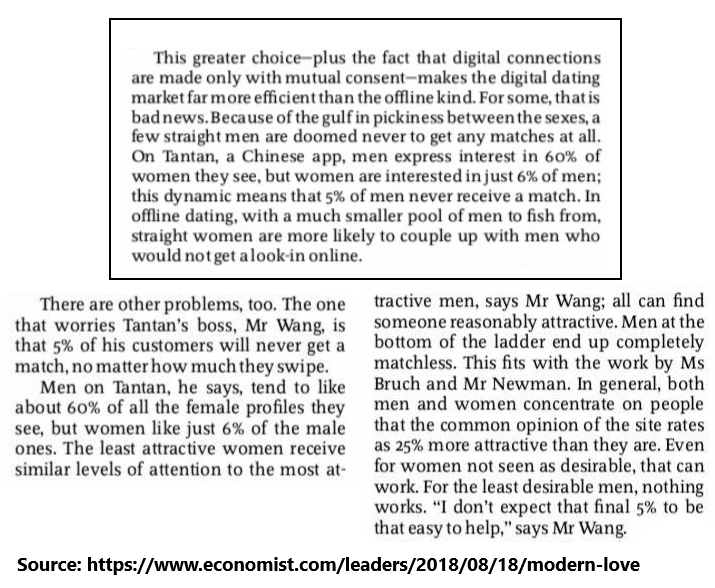- Thread starter
- #1
paulus
Banned
- Joined
- Dec 8, 2015
- Messages
- 11,179
- Reputation
- 18
WHen Men Aren't As Good-Looking As They Think
Researcher finds, again, that men tend to overestimate their own attractivness
Here’s yet another reason why women have better self-insight than men: They are less likely to overestimate their own level of attractiveness.
At least this was the finding of a new study published in a recent issue of Cogent Psychology.
To come to this conclusion, researchers led by Stacy Yen-Lim Sim of Bowling Green State University surveyed 161 university undergraduates. They asked each participant to rate their own level of attractiveness as well as the attractiveness of others in the study. Specifically, here’s how the questions were worded:
- To evaluate self-perceived attractiveness, participants rated, on an eight-point scale, how sexually attractive a given individual would find them.
- To evaluate the attractiveness of others, participants rated the “natural beauty” of others in the study.
They found that men’s ratings of self-perceived attractiveness were higher than women’s ratings; however, looking at others ratings, women were rated overall as more attractive than men.
According to the researchers, this is consistent with previous research showing that men tend to overestimate their own level of attractiveness while women don’t.
But here’s where it gets interesting.
The researchers also examined whether participants’ ratings of others level of attractiveness depended on their ownlevel of self-perceived attractiveness. They found that it did, but only for men. Men who rated themselves as more attractive were more likely to rate others (both women and men) as more attractive. Women, on the other hand, showed no such difference.
Why? While past research suggests that men exaggerate their own level of attractiveness to make themselves seem more competitive in the dating pool (even if only to themselves), this study suggests other factors might be at play. Perhaps attractive males are simply more comfortable rating others highly because they feel secure and unthreatened—but the same does not apply to attractive women. Or, maybe it’s that men who perceive themselves to be attractive (but aren’t) are more lenient grading others attractiveness in the same way they are lenient with themselves.
Regardless of the reason, an interesting fact stands: Women have better insight when it comes to judging attractiveness. They don’t overestimate their own level of attractiveness (like men do), nor do they let their own level of attractiveness bias their ratings of the attractiveness of others.
https://www.psychologytoday.com/blo...when-men-arent-good-looking-they-think[/SIZE]
You Are Less Beautiful Than You Think
In April 15, 2013 Dove launched a 3-minute video entitled “Dove Real Beauty Sketches.” The video achieved instant popularity and has been watched millions of times — a successful viral campaign which has been widely talked about. In the video, a small group of women are asked to describe their faces to a person whom they cannot see. The person is a forensic artist who is there to draw pictures of the women based on their verbal descriptions. A curtain separates the artist and the women, and they never see each other. Before all this, each woman is asked to socialize with a stranger, who later separately describes the woman to the forensic artist. In the end, the women are shown the two drawings, one based on their own description, the other based on the stranger’s description. Much to their amazement and delight, the women realize that the drawings based on strangers’ descriptions depict much more beautiful women. The video ends: “You are more beautiful than you think.”
The idea is quite appealing. Perhaps too many women are unhappy with their looks. It would be a big relief if we all suddenly realized, like Christian Andersen’s ugly duckling, that we are in fact beautiful.
However, what Dove is suggesting is not actually true. The evidence from psychological research suggests instead that we tend to think of our appearance in ways that are more flattering than are warranted. This seems to be part of a broader human tendency to see ourselves through rose colored glasses. Most of us think that we are better than we actually are — not just physically, but in every way.
The most direct evidence that the Dove commercial is misleading comes from the work of Nicholas Epley of the University of Chicago and Erin Whitchurch of the University of Virginia. In a series of studies, Epley and Whitchurch showed that we see ourselves as better looking than we actually are. The researchers took pictures of study participants and, using a computerized procedure, produced more attractive and less attractive versions of those pictures. Participants were told that they would be presented with a series of images including their original picture and images modified from that picture. They were then asked to identify the unmodified picture. They tended to select an attractively enhanced one.
Epley and Whitchurch showed that people display this bias for themselves but not for strangers. The same morphing Procedure was applied to a picture of a stranger, whom the study participant met three weeks earlier during an unrelated study. Participants tended to select the unmodified picture of the stranger.
People tend to say that an attractively enhanced picture is their own, but Epley and Whitchurch wanted to be sure that people truly believe what they say. People recognize objects more quickly when those objects match their mental representations. Therefore, if people truly believe that an attractively enhanced picture is their own, they should recognize that picture more quickly, which is exactly what the researchers found.
Inflated perceptions of one’s physical appearance is a manifestation of a general phenomenon psychologists call “self-enhancement.” Researchers have shown that people overestimate the likelihood that they would engage in a desirable behavior, but are remarkably accurate when predicting the behavior of a stranger. For example, people overestimate the amount of money they would donate to charity while accurately predicting others’ donations. Similarly, people overestimate their likelihood to votein an upcoming presidential election, while accurately predicting others’ likelihood to vote.
Most people believe that they are above average, a statistical impossibility. The above average effects, as they are called, are common. For example, 93 percent of drivers rate themselves as better than the median driver. Of college professors, 94 percent say that they do above-average work. People are unrealistically optimistic about their own health risks compared with those of other people. For example, people think that they are less susceptible to the flu than others. Stock pickers think the stocks they buy are more likely to end up winners than those of the average investor. If you think that self-enhancement biases exist in other people and they do not apply to you, you are not alone. Most people state that they are more likely than others to provide accurate self-assessments.
Why do we have positively enhanced self-views? The adaptive nature of self-enhancement might be the answer. Conveying the information that one has desirable characteristics is beneficial in a social environment. People may try to deceive others about their characteristics, but deception has two main disadvantages. First, it is cognitively taxing because the deceiver has to hold two conflicting representations of reality in mind: the true state of affairs and the deception. The resulting cognitive load reduces performance in other cognitive functions. Second, people are good at detecting deception and they show strong negative emotional reactions toward deceivers. Since in self-enhancement people truly believe that they have desirable characteristics, they can promote themselves without having to lie. Self-enhancement also boosts confidence. Researchers have shown that confidence plays a role in determining whom people choose as leaders and romantic partners. Confident people are believed moreand their advice is more likely to be followed.
Dove’s premise is wrong. But thinking we are more beautiful than we really are may not be such a bad thing.
http://www.scientificamerican.com/article/you-are-less-beautiful-than-you-think/[/SIZE]
The study, published in the Psychological Science journal, could help explain the mystery of why so many men think women are interested in them when in fact they are not, researchers said.
Making moves on a greater number of women, some of whom are better-looking than them, raises the men's risk of an embarrassing knock-back but also reduces the chance of missing out on a potential partner.
...
Researchers put 96 male and 103 female undergraduate students through an exercise where participants spent three minutes talking to each of five members of the opposite sex.
Before the exercise started they were asked to rate their own attractiveness, and after each chat with a potential partner, they ranked that person's appearance and how sexually interested they believed the person was in them.
The experiment showed that men who mistakenly believed they were attractive were more likely to overestimate how interested women were in them.
The more attractive the woman was to the man, the more likely he was to overestimate her interest
Men who were actually rated as attractive by members of the opposite sex did not make the same errors in judgment.
The researchers wrote: "Essentially, men who rated themselves high on attractiveness were more likely to overperceive women’s interest. The more attractive they actually were to women, however, the more likely they were to underperceive."
The study also suggested that women underestimate how interested men are in them, possibly to help deflect unwanted sexual interest, avoid accusations of promiscuity and raise a "choosiness barrier" to single out which men are truly interested in them.
http://www.telegraph.co.uk/news/ukn...-ugly-men-makes-up-for-unappealing-looks.html
https://www.psychologicalscience.org/news/releases/all-it-takes-is-a-smile-for-some-guys.html





Think abou this next time you laugh about this lvl of delusion
Bc we arent better
Last edited by a moderator:
Web discoveries
- Gambling Sites Not On Gamstop
- Casinos Not On Gamstop
- Casino Sites Not On Gamstop
- Non-gamstop UK Casinos
- Best Casino Not On Gamstop
- Gambling Sites Not On Gamstop
- オンラインカジノ サイト
- UK Online Casinos Not On Gamstop
- Best UK Casinos Not On Gamstop
- Sites Not On Gamstop
- Casinos Sin Licencia
- Non Gamstop Casino UK
- Salas Poker España
- Os Melhores Cassinos Online
- Casinos Online
- Non Gamstop Casino Sites UK
- Gambling Sites Not On Gamstop
- Beste Online Casino Nederland
- Best Non Gamstop Casinos
- Betting Site
- Best Betting Sites
- Top UK Casino Sites
- List Of UK Casino Sites
- Meilleur Casino En Ligne
- Non Gamstop Casinos UK
- Casino Non Aams
- Siti Casino Online Non Aams
- Site Paris Sportif Belgique
- Meilleur Site De Casino En Ligne Belgique
- Meilleur Site De Casino En Ligne Belgique
- 稼げるカジノアプリ
- 비트코인 스포츠베팅
- Casino En Ligne Nouveau
- Trang Cá độ Bóng đá
- Casino En Ligne
- Casino En Ligne Avis
- 토토사이트
- Casino En Ligne
- Meilleur Casino En Ligne
- Nouveau Casino En Ligne 2026




